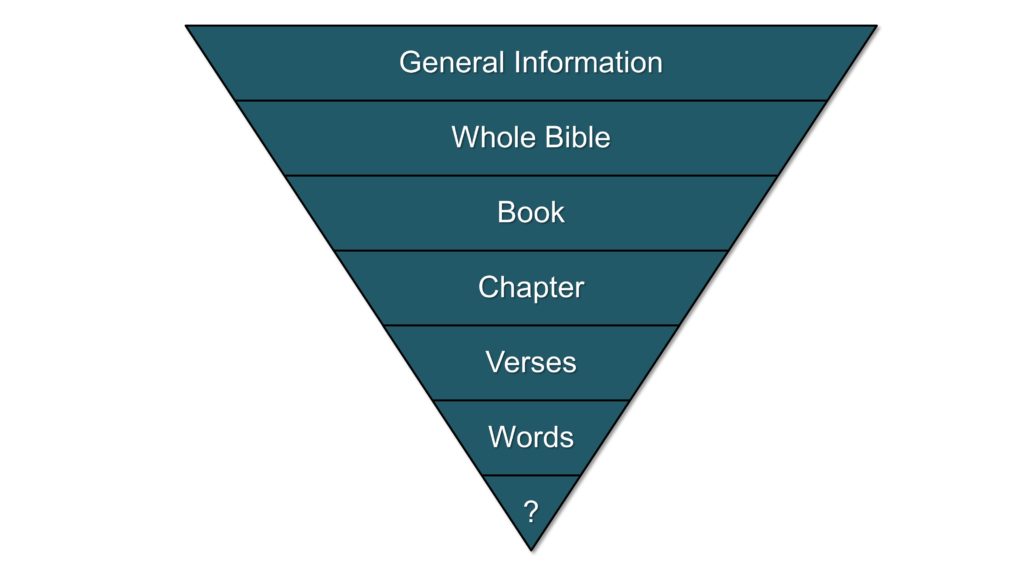How do you know if the Bible really says what you think it says? Today I’m going to give you two questions. If you can answer them correctly, you will never think the Bible says something when it doesn’t.
I recently came across and article that was like so many articles that I have read. Usually I just read them and go on, but this one caught my attention. The title said: “Minneapolis pastor and church expelled over gay marriage.”[i]
The church in question was First Covenant Church and the issue was that the church allows same-sex marriages and also allows LGBTQ people to become leaders in the church. This goes against the policy of the Evangelical Covenant Church denomination, so both the pastor and the church were removed from the denomination.
Another pastor from Michigan was also voted out, because he had traveled to the church in Minnesota to perform his own son’s gay wedding.
What really piqued my interest about the article was not what happened. Unfortunately, that kind of thing takes place regularly.
The part that caught my interest was the last paragraph in the article, because it reveals why this is even an issue in a church.
It was a quote by Matthew Armfield, the son whose dad performed his same-sex wedding. “It is so unbelievably upsetting to see my father, Dan, and my fellow members of First Covenant experience the hate, deceit and actions that go against the teachings of love an inclusion that Jesus Christ preached.”
There are many things wrong with that statement, but the foundation is this: did Jesus really teach “love and inclusion?”
It sounds good, except that’s not what Jesus taught. At least not in the way Matthew Armfield portrayed it. He had totally misread his Bible. When we do that, the results can be catastrophic.
So, we need to correctly understand our Bible. But how?
I’m going to share with you two questions. If you can answer them, you will never misread your Bible.
The first question:
What does it mean? (Interpretation)
This seems simple, but it’s often overlooked. When we begin to read the Bible, we can’t ask “what does it mean for me?” but “what does it mean?”
Of all the things we need to remember, the most important is context. Everything in the Bible was written for a specific reason, and usually to specific people. Our job is to find out what it meant for them, then determine if and how that meaning applies to our lives.
I like to see Bible interpretation as an upside-down triangle. Our job is to get to the point—the real meaning of the passage. But to get there, we have to start at the top and work our way down.

Step 1: General information
General information consists of such information as who wrote or spoke the words we are reading, when it was written, to whom it was written, the background, genre, and relevant culture.
Step 2: Entire Bible
Nothing stands alone in the Bible. How does the passage in question fit in with the overall message of the Bible? Is it in the Old or New Testament? Are there other similar passages?
By the way, here’s a helpful rule of thumb: use the easier passages to help interpret the more difficult ones.
Step 3: Book
Consider the main idea of the whole book. Why was it written? What were the circumstances that prompted the writing?
Step 4: Chapter
Read the whole chapter to get the flow, but remember one thing: chapter and verse divisions aren’t actually part of the Bible. They were added in the late 1500’s. So, it is helpful to assume that they may not be in the right places.
Step 5: Surrounding verses
Look for connecting words like “for,” “therefore,” “so,” and “because.”
Step 6: Specific words
What did the words mean to the original author and recipients? Remember, they weren’t written in English. Fortunately, we have lots of good tools to help us with this.
Now that we’ve figured out how to correctly understand a part of the Bible, we can move on to the fun part: what does it mean for me? This is what we call “application.”
What does it mean for me? (Application)
Notice: I am not trying to find out what it says “to” me, but “for” me. How does what the author originally intended to say apply into my life?
While the whole Bible is beneficial to us in some way, not everything applies directly to us. For example, toward the beginning of the Bible, we find laws imposing dietary restrictions. Unless you are a practicing Jew, they don’t apply to you.
I’ve seen people attempt to count all the promises in the Bible and come up with numbers in the thousands. That’s fine, because it reveals a God who loves humanity, but we have to be careful not to claim promises that were never intended for us.
For example, in Jeremiah 29:11, we read, “For I know the thoughts that I think toward you, says the Lord, thoughts of peace and not of evil, to give you a future and a hope.” The NIV mentions “plans to prosper.” So, we read it and feel comforted in the fact that God promises us endless peace and prosperity. There’s only one problem: Jeremiah 29:11 is written to specific people at a specific time. If you are an Israelite living in the Babylonian captivity, then this promise is for you.
Now, that doesn’t mean that God doesn’t want to give you peace or prosperity, but this passage doesn’t tell you that.
There’s something else that we need to understand when applying the Bible. Some statements in the Bible are descriptive, while others are prescriptive.
Descriptive statements simply tell what happened. David had multiple wives, Paul harmlessly shook a poisonous snake off his arm into the fire, and many early Christians sold everything they owned and donated the money.
While these accounts tell us what happened, they don’t necessarily tell us what we are supposed to do.
On the other hand, prescriptive statements give commands. The trick is knowing the difference between descriptive and prescriptive statements.
Jesus gave the command to go into the world and make disciples. While His immediate audience was those gathered on the Mount of Olives on that day, there are indications that the command is transferred to us, among them His promise that “I am with you always, even to the end of the age” (Matthew 28:20).
Sometimes prescriptive commands don’t come across explicitly. When Jesus said, “Blessed are the meek,” He was setting up a standard for His followers of all time: “Be meek.” When Paul rebuked the factions in Corinth, he was showing that this kind of thing has no place in the church.
In our society, people don’t like to think much. Because of our media, Politicians get elected based on small snippets of what they say. Few people actually sit down and think through things.
We can’t make that mistake with the Bible.
If it is God’s message to us, then it is vitally important that we know what it says and make the correct applications—the ones intended for us in the text.
[i] https://www.foxnews.com/us/minneapolis-pastor-and-church-expelled-over-gay-marriage




Good write up. I needed to be reminded of the principles you spoke of.
Thanks for all you do!
Steve